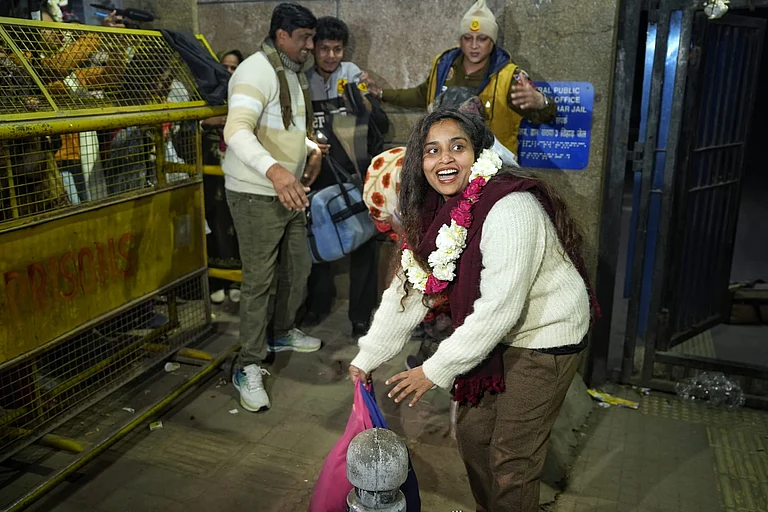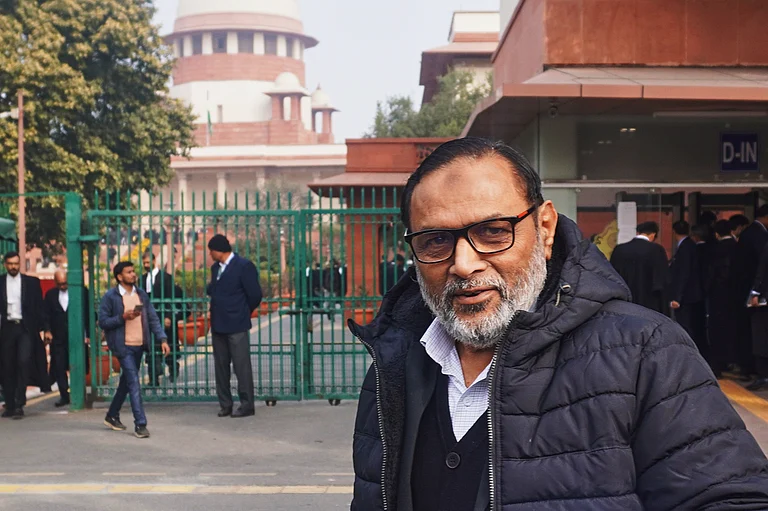A Delhi Court on Friday granted bail to Chief Minister Arvind Kejriwal in the excise policy-linked money laundering case, saying that the Enforcement Directorate (ED) failed provide any direct evidence linked the AAP chief to the crime.
However, Kejriwal's bail order was stayed by the Delhi High Court on an appeal by the federal probe agency.
Special Judge Niyay Bindu of Rouse Avenue Court, in her order, held that prime facie his guilt was yet to be established.
"It may be possible that some persons known to the applicant are having involvement in an offence....but ED has failed to give any direct evidence against the applicant in respect of the proceeds of crime," the judge said.
She raised questions against ED's silence on Kejriwal's stance that he was arrested in the money laundering case without his name being mentioned in the CBI FIR or the ECIR registered by the anti-corruption agency.
Judge Bindu said that it was also noticed that the probe agency is silent about the fact as to how the proceeds of the crime were used by AAP in the Assembly elections in Goa as, admittedly, after about two years, the bigger portion of the alleged amounts is yet to be traced.
She said that the Enforcement Directorate has failed to mention as to how much time is required to trace the entire money trail.
"Meaning thereby that until and unless this exercise of tracing out the remaining amount gets completed by ED, accused is supposed to remain behind bars that too without proper evidence against him. This is also not an acceptable submission of ED," she added.
Judge Bindu said that the maxim of law that every person is innocent until proven guilty does not seem to be applicable in this case.
Quoting Benjamin Franklin, one of the founding fathers of the US, she said, "It is better that 100 guilty persons should escape than an innocent person should suffer."
She said that the principle not only imposes upon the court the duty to prevent any guilty individuals from escaping justice but also to make sure that no innocent person suffers. There have been thousands of cases where the accused underwent a long lasting trial and agony resulting from the same till the date they were acquitted by the court for being innocent, Judge Bindu noted.
She said that the mental and physical agony of such a person cannot be compensated in any matter whatsoever.
The court also noted the probe agency's "failure" to answer the applicant's objection over his summonses. The judge said that there are certain undisputed facts, as specified on behalf of Kejriwal, that the ED had the material in July 2022 but they only called the AAP chief in August 2023, which shows malafide on the part of the federal agency.
She also dismissed the ED's argument that "investigation is an art and sometimes one accused is given lollypop of bail and pardon and induced with some assurance to make them tell the story behind the offence".
If that were the case, she said, then any person could be implicated and kept behind bars by "artistically procuring the material against him after artistically avoiding/ withdrawing exculpatory material from the record. This very scenario constrains the court to draw an inference against the investigating agency that it is not acting without bias".
Noting the Additional Solicitor General's (ASG) point about inducement to extract the truth against other accused involved in the matter, she said, "But the effect of this submission goes to the conception that the complete truth cannot be revealed through the persons who have resiled from their previous statements."
"Rather, the complete truth shall be established on the basis of the incriminating material, if available on record which the investigating agency is under an obligation to procure in a legal manner by following the procedural aspects as well," the judge added.
Judge Bindu observed that allegations against Kejriwal emerged during the statements of some co-accused. She said that it is an admitted fact that Kejriwal has not summoned by the court after his arrest and is "lying in judicial custody at the instance of ED on the pretext of the investigation being still on".
"On the prima facie basis, the guilt of the accused is yet to be established. In respect of the condition that he shall not involve in the offence after his release on bail, it is already undertaken so by the applicant in his application. Moreover, if bail is granted, the same shall be conditional which shall put the applicant under an obligation in this regard," she said.
Arvind Kejriwal and his Aam Aadmi Party (AAP) is accused of receiving kickbacks of Rs 100 crore from the South Group, a cartel of politicians, businessmen and others to rig the Delhi liquor policy in favour of licencees.
The Delhi court on Thursday ordered Kejriwal's release on bail on a personal bond of Rs 1 lakh. It, however, imposed certain conditions on the AAP leader before granting him the relief, including that he will not try to hamper the investigation or influence the witnesses.
Kejriwal was arrested by the anti-corruption agency on March 21, shortly after the Delhi High Court denied him protection from arrest on his petition challenging summonses issued to him.
(With PTI inputs)


























